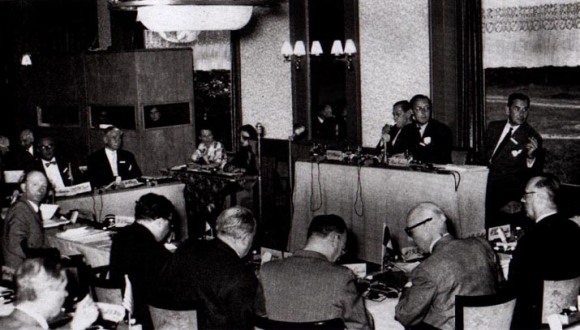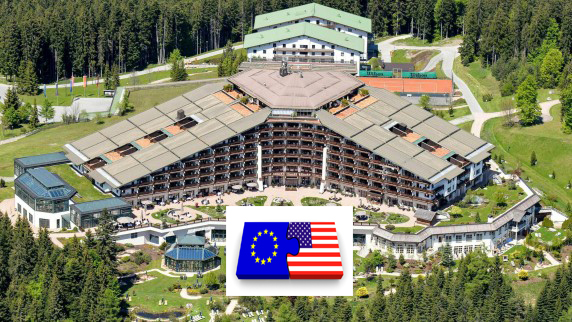
In preparation for discussion of this item on the agenda, a note emanating from a British source and presented in the form of a questionnaire had been distributed to participants, as well as an American note which replied in part to this questionnaire. The British note comprised six questions:
1. Will the United States Government go ahead with the Kennedy Round? What are the obstacles to rapid advance (a) in the U.S.? (b) in Europe?
2. Will the United States administration reinstate the Douglas amendment? If not, does this mean that the whole concept of abolishing tariffs on industrial products over a wide area is to be dropped and the only proposal will be the reduction of tariffs over a period of years?
3. What reciprocity in the agricultural field does the United States expect from the E.E.C.? What degree of freedom for entry of agricultural products does it regard as a precondition of any reduction of industrial tariffs? If the E.E.C. makes a concession in this field, will the United States pay for it by making additional reductions in the industrial field? Does the United States consider that there is the slightest chance of France agreeing to a more liberal import policy for agricultural products?
4. What happens if the E.E.C. adopts a wholly negative attitude? Does this mean that all tariff reduction then comes to a halt or would the U.S. be prepared to go ahead on a tariff reducing scheme with those countries that were prepared to co-operate?
5. In the meantime will United States tariff policy be on a basis that is consistent with the general objective of reducing tariffs? We have had recent examples to the contrary in the cases of a number of products and others are being threatened.
6. What effect has the breakdown of Brussels had on the U.S. attitude towards trade in peaceful goods with the Soviet block?
The American note was primarily concerned with the failure of the Brussels negotiations and indicated that this raised four main questions, concerning respectively:
-President Kennedy’s willingness and ability to implement the Atlantic trade partnership which was the aim of the Trade Expansion Act; (the Act provided for such a possibility in respect of industrial products where the exports of theUnited States and the European Community combined accounted for 80% or more of total free world exports)
-the extent of European interest in liberalization of trade with the United States;
-trade in agricultural products, particularly those products which are subject to the Community’s variable import levy system; -possible alternatives to an Atlantic trade partnership.
In the course of the discussion, a number of speakers referred to the failure of the Brussels negotiations in January 1963, a subject already touched on during the exchange of views concerning the first item of the agenda.
Several speakers sought to list the conflicting viewpoints which finally caused or at any rate contributed to the breakdown. In this connexion, a British speaker countered the argument advanced earlier by a French speaker, according to which it was up to Great Britain to accept the Rome Treaty outright without requiring any substantial alteration and that the reasons for the French government’s attitude should be looked for there and nowhere else. It must be admitted, said the British speaker, that Great Britain’s economic strength involved fundamental problems affecting the Commonwealth, the European Free Trade Association, the United States and the Afro-Asian world.
A French participant recognised the world-wide nature of the problems raised by Great Britain’s entry (the monetary problem of the pound sterling, the problem of aid, the problem of agricultural products) which the Community had not been able to deal with as a whole and which it would not have been able to solve either if Great Britain had entered the Common Market. He considered that the negotiations between the United Kingdom and the Community represented a sort of bet that they would be solved, a bet made hazardous by the narrow framework chosen.
An American participant emphasised how the United States government, in spite of the protectionist forces in the country, had decided after prolonged hesitation on a liberal policy, partly from conviction but also because it considered this essential in the struggle against communism, in order to expand markets, assist underdeveloped countries and, finally, in the interest of the United States.
Another American speaker outlined the steps taken by his government since the war in order to achieve close Atlantic co-operation: he cited the Marshall Plan and the support given to European integration on a supranational basis and covering the United Kingdom. Such a system would likewise protect the interests of the smaller European countries and make co-operation with the United States possible on an equal footing, the United States not being in a position to enter a system of unification such as was planned for Europe. Finally, there would be no question of American “leadership”, a term which called up the notion of domination.
In this connexion, an American participant furnished a number of chronological indications concerning the possible development of the Kennedy Round, making due allowance for the provisions of the Trade Expansion Act. The President would first have to publish a list of those articles concerning which he intended to negotiate. The Tariff Commission would have six months following such publication in which to hear from all interested parties and to determine the economic effect of the proposed reductions. Following this hearing, certain articles might be struck off the original list.
Another American speaker, however, pointed out that consideration must be given to the climate prevailing within the United States when the Trade Expansion Act entered into force. The protectionist elements had declined and many businessmen had become extremely liberal but there was still persistent unemployment, which might be structural, in certain areas. It followed that a lowering of customs barriers which would increase that unemployment without increasing exports would be badly received. If, in addition, a foreign government were to adopt public positions of a somewhat arbitrary nature towards American proposals, not only would the task confronting Mr. Herter, the negotiator appointed by the President, which was already crushing, be made even heavier, but the protectionist faction in Congress might even bring about amendments to the Act.
A British participant alluded to a certain bitterness in his country following on events in Brussels which had occasioned an increase in nationalism calculated to have an unfavourable influence on his country’s position vis-a-vis the negotiations contemplated by President Kennedy.
Since, however, the problems involved were so acute, a number of speakers felt that negotiation merely aimed at further freeing of trade would be unable to furnish a solution. What was needed was to achieve a genuine joint policy in this field centered not only on agricultural prices as such but also and above all on the production levels considered desirable.
In this connexion, a French participant, supported by another French speaker, recommended that the steps taken at the national level to implement this policy should seek to improve the prospects of the agriculturalists concerned (individual assistance) rather than maintain an artificial production level at all costs.
Another French participant commented that the policies so far followed by the various governments were distinguished by a certain contempt for economic laws which was not unconnected with the extensive disarray to be observed at the present time, e.g. the agriculturalist’s right to produce things which nobody wanted— if the demand was lacking, the price was raised! The adoption of a joint policy at Atlantic level might offer a means of reversing this trend.
The question of whether we were moving towards a continental Europe or whether Europe genuinely aspired to partnership with America was raised by a Netherlands speaker and a senior international civil servant who, without thereby denying that difficulties might well arise on the European side, emphasised that it was equally up to the United States to effect a considerable revision of certain regulations at present governing its trade policy and which were not related to tariffs and quotas strictly speaking.
In this regard, an American participant stressed that his country was prepared to study equally the thorny problem of “non-tariff barriers”. But the important thing was that these should be clearly identified; similar barriers likewise existed on the EEC side. This question might initially be dealt with, among others, by the preparatory inter-ministerial meeting planned within the framework of GATT for May 1963.
Due allowance should also be made for certain inequalities in the relative opportunities for industrial producers on either side of the Atlantic. Three of these barriers were particularly stressed by a French participant, supported by another French speaker, namely:
-The greater size of American firms capable of giving them a greater trading strength than that of their European competitors. It was true that mergers and regroupings took place within the Common Market but some time was still needed before genuine balance would exist in this connexion.
-The exceptional assistance provided to certain advanced American industries (e.g. in the realm of space research) by the massive orders placed by the United States government, whereas there was no corresponding support for the same industries in Europe. This point was also made by a Belgian participant.
-The unevenness of American tariffs, some of which reached extremely high rates, much higher than those of the Common Market. This was the cause of the demand for a lowering of the level of such tariffs before negotiations began on equality of reductions to be granted by both sides.
In the course of the discussion, a number of speakers dwelt on the global nature of the problems requiring solution, the approaches to be adopted and the goals to be reached as well as on the importance of the attitude taken by the general public towards the new choices to be made.
As a British participant emphasised, it was a question of improving the trade structure throughout the whole free world. It was essential, therefore, as of now, that the European Community, Great Britain and the United States should avoid any steps calculated to endanger subsequent negotiations. It was essential to combat any signs of protectionism which were often the economic reflection of a rebirth of nationalism.
This attitude should take concrete form, suggested a Netherlands participant, through the adoption of a joint code of good behaviour in regard to international trade which would formally reject subsidies, dumping, cartels, etc. Moreover, as a French, an Italian and a Netherlands participant emphasised, joint lines of action should be laid down, whether it was a question of agricultural products, assistance to underdeveloped countries, financial conditions ensuring a balanced expansion or a number of other fields.
All this implied, however, not only new institutions and a new distribution of the burden but also perhaps a new outlook, a new way of thinking in terms of association, in short a profound alteration in men’s minds. Such a change could not take place overnight and this was likewise stressed by a number of other participants who, on the whole, showed cautious optimism concerning the future. There would certainly be several “rounds”, sometimes involving sharp discussions, before final success was achieved. The essential thing was to overcome present bitterness, however legitimate, and not to represent the difficulties which would inevitably arise as so many final failures.
